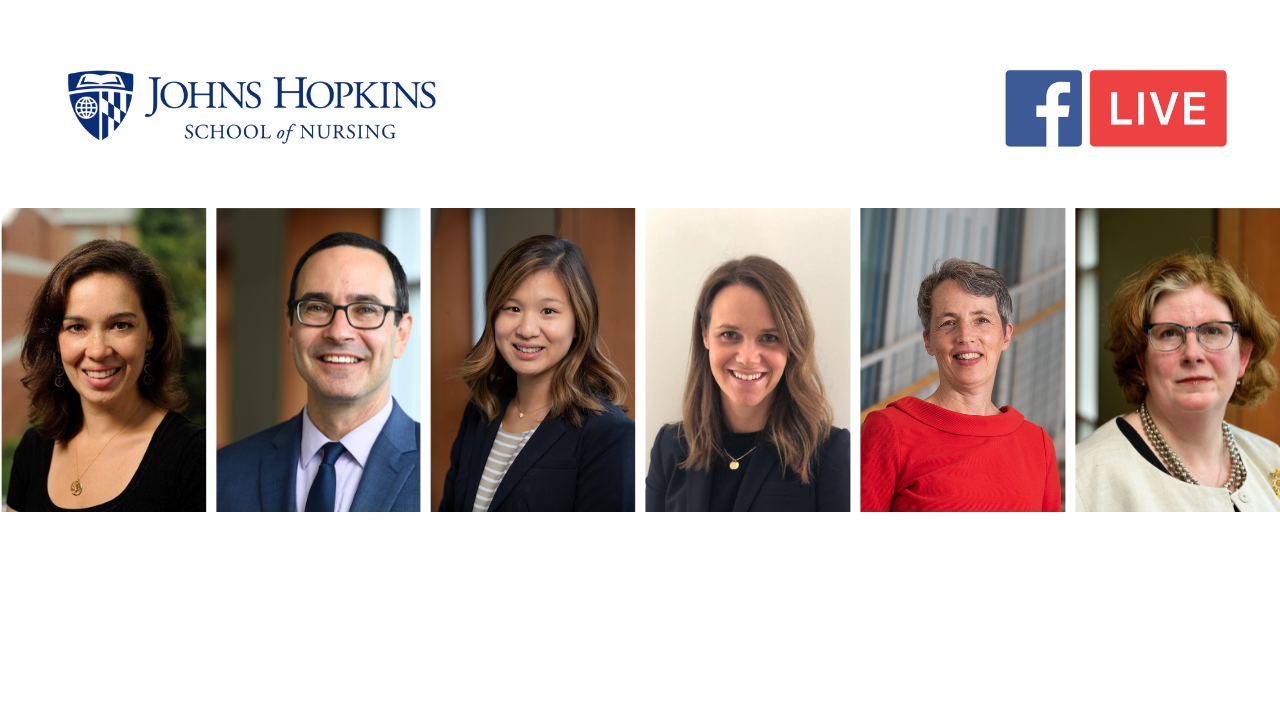Happy Nurses’ Week!
The COVID-19 pandemic is a remarkable—and extremely challenging—time to be a nurse. And we hold a unique position because the world recognizes social determinants of health, and understanding a person in the context of their life circumstances is Nursing’s wheelhouse.
Already four in 10 nurses do not work in the hospital setting. At the precipice of change, with a unique perspective on where health care is headed, experts from across Johns Hopkins talk about nurses in the community and how we’re shaping the future of health care.
QUESTIONS
- What’s driving the healthcare shift from clinical focus to community focus?
- What new technology and infrastructure is available that is creating space for care outside of the clinical setting? (i.e. telehealth)
- How is the transition to care outside of the clinical setting helping underserved communities?
- Four in 10 nurses do not work in hospitals. Where else can we find nurses, what kind of work do they do, and how can future nurses find these kind of roles?
- Where do we see the health care system in 30 years? What are your predictions?
PANELISTS
A number of years ago, while making house calls as a nurse practitioner to homebound, low-income elderly patients in West Baltimore, Dr. Szanton noticed that their environmental challenges were often as pressing as their health challenges. Since then she has developed a program of research at the Johns Hopkins School of Nursing on the role of the environment and stressors in health disparities in older adults, particularly those trying to “age in place” or stay out of a nursing home. The result is a program called CAPABLE, which combines handyman services with nursing and occupational therapy to improve mobility, reduce disability, and decrease healthcare costs. She has tested the program’s effectiveness through grants from the National Institutes of Health and the Innovations Office at the Center on Medicaid and Medicare Services. She has major funding from the Rita and Alex Hillman Foundation to build infrastructure for the CAPABLE program. She has also conducted a study, funded by the Robert Wood Johnson Foundation, of whether food and energy assistance improve health outcomes for low-income older adults. A former health policy advocate, Dr. Szanton aims her research and publications toward changing policy for older adults and their families.
Craig Pollack is the Katey Ayers Endowed Professor at the Johns Hopkins School of Nursing and in the Department of Health Policy and Management at the Johns Hopkins Bloomberg School of Public Health. He is a practicing primary care, internal medicine physician whose research focuses on social determinants of health, with an emphasis on housing policies. In work funded by the Robert Wood Johnson Foundation, the U.S. Department of Housing and Urban Development, and the National Institutes of Health, Dr. Pollack is examining the health effects of housing mobility programs that enable families to move from areas of concentrated poverty. Additional research investigates the impact of housing affordability and place-based initiatives on health care use, spending, and outcomes. In other work, Dr. Pollack also performs cancer health services research, investigating issues related to health disparities and the role of provider and patient social networks across the cancer continuum. He received his medical degree and was an internal medicine resident at the University of California at San Francisco. He then received a master’s degree from the University of Pennsylvania where he was a Robert Wood Johnson Foundation Clinical Scholar.
Dr. Christina Marea is Certified-Nurse Midwife and Assistant Professor at Georgetown’s School of Nursing and Health Sciences. She holds a PhD from Johns Hopkins School of Nursing. Christina is currently a TL1 post-doctoral fellow at the Georgetown-Howard Center for Clinical and Translational Science (GHUCCTS). Her research broadly focuses on disparities in perinatal and reproductive health outcomes for marginalized and structurally disadvantaged populations, and health services interventions to address these disparities. Christina has practiced clinically in birth centers, refugee camps, rural hospitals, and tertiary care hospitals. Christina has led research, clinical, and consulting collaborations in Guatemala, Jordan, Syria, Somalia, Kenya, Ethiopia, South Sudan and Uganda. She co-led the development of an innovative Health Equity curriculum for nurse-midwifery students. Christina currently practices midwifery at Community of Hope, an FQHC in Washington DC. Christina is the Co-chair of the DC Maternal Mortality Review Commission, and the incoming Chair of the Division of Global Engagement at the American College of Nurse-Midwives.
Mirini Kim
Breaking the Mold: Alumni Talk with Mirini Kim
Mirini Kim is the Director of Nursing at PocketRN and serves as part-time faculty at the Johns Hopkins University School of Nursing. She is a board-certified Pediatric Nurse Practitioner in Primary Care and a graduate of the Johns Hopkins University Executive Doctor of Nursing Practice program.
Before joining PocketRN, Mirini worked in the orthopedic surgery, bone health program, and neuromuscular clinic at Children’s National Hospital in Washington, D.C. Her clinical practice is focused on children with rare bone disorders, neuromuscular diseases, and low bone density.
In addition, Mirini has served as a clinical preceptor and Cohen Scholar faculty mentor. She is passionate about cultivating a community of learning. She strongly believes that teaching and mentoring students make her a better clinician. In her free time, Mirini enjoys cooking and spending time with her husband and two doodles, Maggie and Luna.
Katie Phillips
Breaking the Mold: Alumni Talk with Katherine Phillips
Katie Phillips, a Family Nurse Practitioner, joined the Esperanza Center in January 2017 as a staff clinician, and took a leadership role in the clinic in January 2019. She received a BSN from Johns Hopkins University School of Nursing and then went on to pursue a Masters of Nursing and Masters of Public Health, also at Johns Hopkins. Her experience is in the primary care setting in underserved communities and she has special interest in chronic disease management, as well as population health. Prior to joining the Esperanza Center, she worked as an FNP at a Baltimore-area Federally Qualified Health Center.
Prior to pursing nursing, Katie worked stateside on public health policy at both a local and state level in several roles, including as a Special Assistant to the Commissioner of Health for Baltimore City. She also served as a Peace Corps Volunteer in Costa Rica in the Rural Community Development program.
Catherine Ling’s scholarship is focused on improving primary care for vulnerable populations. Her more than 25 years as a family nurse practitioner have centered on providing functional access to ambulatory care in community settings. As an educator, she provides innovative and rigorous curriculum and course design and delivery for quality learning and practice outcomes. Dr. Ling has led and participated in the planning, implementation, and evaluation of macro- and micro-level population health interventions for disease prevention and disaster planning in the federal and private sectors. She is a fellow of the American Association of Nurse Practitioners.
Read more:
- Breaking the Mold: Alumni Talk with Katherine Phillips
- Breaking the Mold: Alumni Talk with Mirini Kim
- Dr. Craig Pollack is Connecting Scholars Across Johns Hopkins for a Multidisciplinary Approach to Housing and Health
- A Platform for Greater Impact
- Facebook Live: The Future of In Person and Virtual Care


